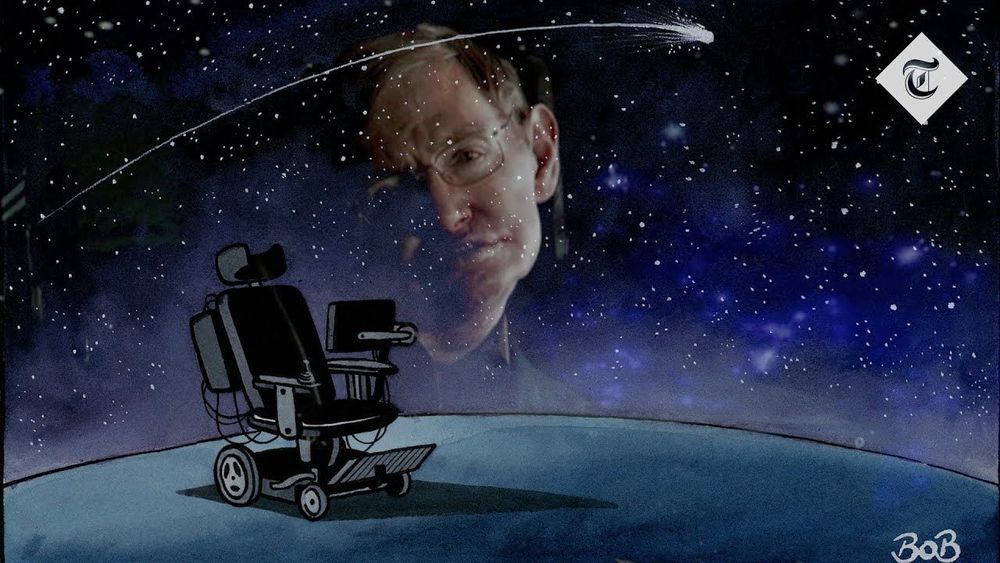May 1, 2020
How To Detect Signs Of Life From Planets Circling Dying Stars
Posted by Bruce Dorminey in category: alien life
Cornell astronomers plot how to take spectra from extrasolar earths trapped in orbits around dying white dwarfs.
Cornell astronomers plot how to take spectra from extrasolar earths trapped in orbits around dying white dwarfs.

On Earth, there are organisms that resist radiation, heat, cold, and drying, even to the point of being able to live in the space vacuum.
Genetic biotechnology is usually discussed in the context of current and emerging applications here on Earth, and rightly so, since we still live exclusively in our planetary cradle. But as humanity looks outward, we ponder what kind of life we ought to take with us to support outposts and eventually colonies off the Earth.
Continue reading “Deep-space travel, colonization may rely on genetically engineered life forms” »
The Dishchii’bikoh meteorite fall in the White Mountain Apache reservation in central Arizona has given scientists a big clue to finding out where so-called LL chondrites call home. They report their results in the April 14 issue of Meteoritics and Planetary Science.
“LL chondrites are fairly common meteorites with low-oxidized and low metallic (LL) iron content,” said Peter Jenniskens, the lead author and meteor astronomer with the SETI Institute and NASA Ames Research Center. “We want to know where they originated because the damaging Chelyabinsk airburst of February 15, 2013 in Russia, was caused by a particularly large 20-meter sized LL chondrite.”
LL chondrites originate from somewhere in the asteroid belt between Mars and Jupiter, where a parent body broke up and created a family of asteroids long ago. Occasional collisions with those family members eject rocks into orbit around the Sun. When these small asteroids collide with Earth’s atmosphere, they cause a bright meteor from which pieces survive sometimes and fall on the ground as meteorites.
Researchers have discovered a new Earth-sized planet orbiting a star outside our solar system. The planet, called Kepler-1649c, is only around 1.06 times larger than Earth, making it very similar to our own planet in terms of physical dimensions. It’s also quite close to its star, orbiting at a distance that means it gets around 75% of the light we do from the Sun.
The planet’s star is a red dwarf, which is more prone to the kind of flares that might make it difficult for life to have evolved on its rocky satellite’s surface, unlike here in our own neighborhood. It orbits so closely to its star, too, that one year is just 19.5 of our days — but the star puts out significantly less heat than the Sun, so that’s actually right in the proper region to allow for the presence of liquid water.
Kepler-1649c was found by scientists digging into existing observations gathered by the Kepler space telescope before its retirement from operational status in 2018. An algorithm that was developed to go through the troves of data collected by the telescope and identify potential planets for further study failed to properly ID this one, but researchers noticed it when reviewing the information.
Giant elliptical galaxies are not likely to be havens for technological life, argues new paper.
I recognized that the model used in the 2015 paper —- along with the known distributions and numbers of spiral and elliptical galaxies —- violated the Principle of Mediocrity, says Whitmire. That means if a technological species was selected at random anywhere in the local universe, the probability that it would reside in an elliptical galaxy would be 99 percent. Since we earthlings don’t find ourselves in an elliptical galaxy, Whitmire says this creates what he calls a statistical paradox.
My solution was to look for physical processes that would mitigate this inconsistency, says Whitmire. Current observations show that the ancestors of today’s large elliptical galaxies were once more compact, he says. This was the key, says Whitmire. This means that when these galaxies went through their early high-energy quasar and starburst phases, the radiation doses to young planets within these galaxies would have been lethal and permanent, he says.
Continue reading “Giant Elliptical Galaxies Are Not Likely To Be ‘Cradles Of Life’” »

“We should plan ahead,” warned physicist Stephen Hawking who died last March, 2018, and was buried next to Isaac Newton. “If a superior alien civilization sent us a text message saying, ‘We’ll arrive in a few decades,’ would we just reply, ‘OK, call us when you get here, we’ll leave the lights on’? Probably not, but this is more or less what has happened with AI.”
The memorial stone placed on top of Hawking’s grave included his most famous equation describing the entropy of a black hole. “Here Lies What Was Mortal Of Stephen Hawking,” read the words on the stone, which included an image of a black hole.
:oooooo.
Rutgers researchers have discovered the origins of the protein structures responsible for metabolism: simple molecules that powered early life on Earth and serve as chemical signals that NASA could use to search for life on other planets.
Their study, which predicts what the earliest proteins looked like 3.5 billion to 2.5 billion years ago, is published in the journal Proceedings of the National Academy of Sciences.
Continue reading “Scientists have discovered the origins of the building blocks of life” »
The building blocks of life can, and did, spontaneously assemble under the right conditions. That’s called spontaneous generation, or abiogenesis. Of course, many of the details remain hidden to us, and we just don’t know exactly how it all happened.
Or how frequently it could happen.
The world’s religions have different ideas of how life appeared, of course, and they invoke the magical hands of various supernatural deities to explain it all. But those explanations, while colorful tales, leave many of us unsatisfied.
Based on myth and such it could a definite possibility that this tale is true.
Amelia Earhart was one of the first female pilots in Earth history. She had been on expeditions all over the world, and recalled seeing people doing all kinds of strange things to their bodies. In the mid–20th century she became famous for being the first woman to fly across the Atlantic Ocean. In 1937 she attempted to fly around the world, and on July 2nd, she and her navigator, Fred Noonan, took off from New Guinea and headed east, around the equator.
However, while over the Pacific Ocean, their Lockheed L-10 Electra airplane ran low on gas. They began looking for an atoll to set down on, and tried to send out an SOS. Suddenly, they saw a huge light behind them. The plane stopped dead, and then started moving backwards towards the light. That was the last Earhart remembered of the event. They were in fact being abducted by an alien species, the Briori. To the outside world, it appeared that the plane just vanished somewhere in the South Seas.